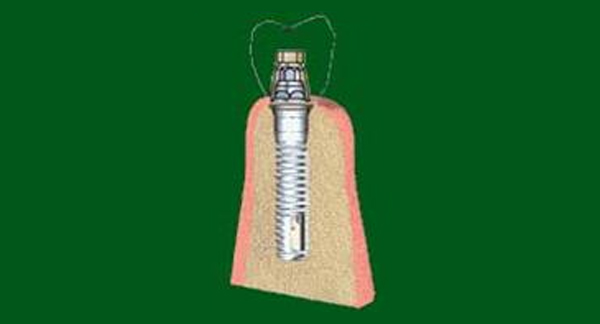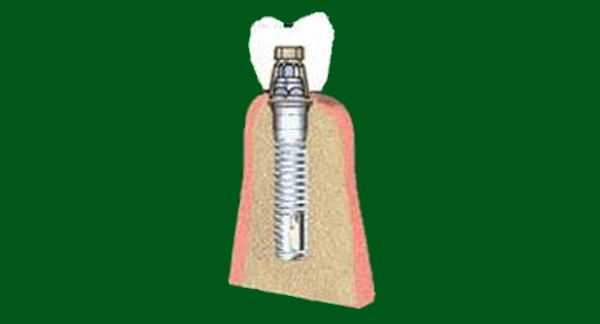- Our Services
Dental Implants

Dental Implants
What is a dental implant?
A dental implant is an artificial root of a tooth that is inserted into the jawbone. A replacement tooth is built on the implant to simulate the natural tooth in terms of colour, shape and position. Dental implants are made of titanium as it has the special property of forming a firm biological “bond” with the jawbone. The bonding is known technically as osseo-integration and this is the basis of dental implant treatment. If this bond is not achieved, then implant treatment will not work. Fortunately, it works in most cases.
I have a few missing teeth. Am I suitable for implants?
You are suitable for implants if you are:
- Medically healthy. As long as you are able to have an extraction or undergo a minor operation without any special precaution, it is possible to have dental implants.
- The site of the missing teeth must have sufficient bone, in terms of thickness and height. In addition, the gums must also be healthy.
- Vital structures such as nerves or sinuses must not encroach on the position of the implants.
- Good oral hygiene and motivation. As with natural teeth, implant restored teeth must be brushed and kept clean regularly. If you smoke, it may be advisable to stop smoking. There is now evidence to suggest that smoking is harmful for the long-term success of dental implants.
To assess the above conditions, you would normally be required to have a clinical assessment, together with investigations such as digital X-rays, photographs and study-models of your teeth. Special investigations such as computerized tomograms and computer software simulation may be necessary in complicated cases. In our clinic, state-of-the art cone beam computerized tomography is used to assess the bone condition and to plan for surgery. With this 3-dimensional details of the bone, exact details of the surgery can be planned accurately.
I am wearing full dentures now. Am I suitable for dental implants?
The same conditions as above apply. However, the surgeon has to consider the position of your lower jaw in relation to the upper jaw bone.
How many implants can I have?
It depends on the number of missing teeth. Each missing tooth can be restored with a single implant. However, a minimum number of implants can be used to replace multiple missing teeth by ‘bridging’ two or more implants together. The final decision will have to depend on the clinical condition and cost factor.
What does implant treatment involve?
Dental implants traditionally involve 3 phases:
Phase 1 is involves a surgery to insert the implants into the jawbone. This can usually be done as outpatient with local anaesthesia (and sedation). Complicated cases may require hospitalization with the surgery done under general anaesthesia. After the appropriate healing of about ten weeks, the implants are connected to the oral cavity to allow for the gums to heal. This cuff of gums is special in that it is the interface between the external oral and internal jaw bone.
Phase II is the construction of the replacement teeth. The replacement teeth are built on abutments that have been tightened onto the implants. Some replacement teeth are cemented on whilst some are screwed on. The dental surgeon will decide based the clinical assessment.
Phase III is the regular maintenance of the implant-restored teeth. X-rays may be required to study the osseointegration.



In selected cases, where all conditions are ideal, all the three phases can be shortened to one single stage. This is called “immediate loading”. This is a result of improvement in the implant design and more scientific evidence of success. However, a lot of pre-surgical preparation is required before this “instant” implant treatment. State-of-the-art implant surgery with Nobel Guidetm is available at our clinic. With this, the replacement teeth / bridge are inserted on the same day as the implants are placed into the bone.
What are the advantages of dental implants?
With dental implants, the bite force is close to natural teeth, if not stronger. A denture or ‘false teeth’ only provides up to 25% of the natural bite force. Also, there is no plastic flange that covers part of the palate or gums.
If a bridge is used to replace the missing teeth, the drilling of the adjacent teeth is required to provide the ‘strut’ or ‘support’. Over the long-term, it may give rise to problems such as decay, gum disease and loosening of the teeth. With dental implants, drilling of the adjacent teeth especially good teeth with no filling whatsoever, is avoided.
One of the main advantages of the dental implants is that the bone is preserved, instead of resorbing or thinning.
How much does it cost?
Generally in Singapore, the complete treatment for each dental implant ranges from $3500-$5000. However, the final charges will depend on your condition, treatment needs and other factors.
What are the complications?
Straight-forward implant surgery is usually free of complications. However as in any field of medicine, complications may occur. These include bleeding, discomfort, swelling, bruising and injury to adjacent anatomical structures such as nerves and sinuses. An experienced surgeon, who has undergone an accredited Oral & Maxillofacial Surgery training programme, can usually anticipate the common complications and strive to avoid them at all cost. However, the risks in complicated implant surgery are naturally higher. Complicated cases where advanced surgical procedures are required include bone grafting, nerve displacement, multiple implants and distraction osteogenesis.
Another complication is poor aesthetics especially with anterior teeth. The replacement teeth can be redone without any effect on the implant that has bonded in the bone.
How long can an implant last?
One would like to have implants to last a lifetime. However, as in any field of medicine, there are multiple factors that may affect the longevity of the implants. These include the patient’s health, oral hygiene and habits such as clenching and grinding at night (bruxism). Additionally, the treatment process must take into consideration careful planning, choice of implant system, proper implant placement and appropriate construction of the replacement teeth to maximise the functional forces of mastication. Additionally, there is now sufficient scientific evidence to show that smoking can affect the long-term survival of implants. Experts generally agree that implants should last at least ten years.


